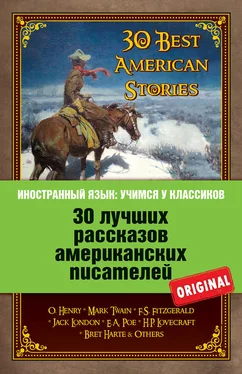Rivarol dashed away a not discreditable tear, and resumed:
‘My only hope lies in this discovery of perpetual motion. It will give me the fame, the wealth. Can Jocasta refuse these? If she can, there is only the trap-door and – Kerguellen’s Land!’
I bashfully asked to see the perpetual-motion machine. My uncle in affliction shook his head.
‘At another time,’ he said. ‘Suffice it at present to say, that it is something upon the principle of a woman’s tongue. But you see now why we must turn in your case to the alternative condition – infinite speed. There are several ways in which this may be accomplished, theoretically. By the lever, for instance. Imagine a lever with a very long and a very short arm. Apply power to the shorter arm which will move it with great velocity. The end of the long arm will move much faster. Now keep shortening the short arm and lengthening the long one, and as you approach infinity in their difference of length, you approach infinity in the speed of the long arm. It would be difficult to demonstrate this practically to the professor. We must seek another solution. Jean Marie will meditate. Come to me in a fortnight. Good-night. But stop! Have you the money – das Geld?’
‘Much more than I need.’
‘Good! Let us strike hands. Gold and Knowledge; Science and Love. What may not such a partnership achieve? We go to conquer thee, Abscissa. Vorwärts! [170] Vorwärts! = Forward! ( German )
’
When, at the end of a fortnight; I sought Rivarol’s chamber, I passed with some little trepidation over the terminus of the Air Line to Kerguellen’s Land, and evaded the extended arms of the Petty Cash Adjuster. Rivarol drew a mug of ale for me, and filled himself a retort of his own peculiar beverage.
‘Come,’ he said at length. ‘Let us drink success to the TACHYPOMP.’
‘The TACHYPOMP?’
‘Yes. Why not? Tachu , quickly, and pempo, pepompa, to send. May it send you quickly to your wedding-day. Abscissa is yours. It is done. When shall we start for the prairies?’
‘Where is it?’ I asked, looking in vain around the room for any contrivance which might seem calculated to advance matrimonial prospects.
‘It is here,’ and he gave his forehead a significant tap. Then he held forth didactically.
‘There is force enough in existence to yield us a speed of sixty miles a minute, or even more. All we need is the knowledge how to combine and apply it. The wise man will not attempt to make some great force yield some great speed. He will keep adding the little force to the little force, making each little force yield its little speed, until an aggregate of little forces shall be a great force, yielding an aggregate of little speeds, a great speed. The difficulty is not in aggregating the forces; it lies in the corresponding aggregation of the speeds. One musket ball will go, say a mile. It is not hard to increase the force of muskets to a thousand, yet the thousand musket balls will go no farther, and no faster, than the one. You see, then, where our trouble lies. We cannot readily add speed to speed, as we add force to force. My discovery is simply the utilization of a principle which extorts an increment of speed from each increment of power. But this is the metaphysics of physics. Let us be practical or nothing.
‘When you have walked forward, on a moving train, from the rear car, toward the engine, did you ever think what you were really doing?’
‘Why, yes, I have generally been going to the smoking car to have a cigar.’
‘Tut, tut – not that! I mean, did it ever occur to you on such an occasion, that absolutely you were moving faster than the train? The train passes the telegraph poles at the rate of thirty miles an hour, say. You walk toward the smoking car at the rate of four miles an hour. Then you pass the telegraph poles at the rate of thirty-four miles. Your absolute speed is the speed of the engine, plus the speed of your own locomotion. Do you follow me?’
I began to get an inkling of his meaning, and told him so.
‘Very well. Let us advance a step. Your addition to the speed of the engine is trivial, and the space in which you can exercise it, limited. Now suppose two stations, A and B, two miles distant by the track. Imagine a train of platform cars, the last car resting at station A. The train is a mile long, say. The engine is therefore within a mile of station B. Say the train can move a mile in ten minutes. The last car, having two miles to go, would reach B in twenty minutes, but the engine, a mile ahead, would get there in ten. You jump on the last car, at A, in a prodigious hurry to reach Abscissa, who is at B. If you stay on the last car it will be twenty long minutes before you see her. But the engine reaches B and the fair lady in ten. You will be a stupid reasoner, and an indifferent lover, if you don’t put for the engine over those platform cars, as fast as your legs will carry you. You can run a mile, the length of the train, in ten minutes. Therefore, you reach Abscissa when the engine does, or in ten minutes – ten minutes sooner than if you had lazily sat down upon the rear car and talked politics with the brakeman. You have diminished the time by one half. You have added your speed to that of the locomotive to some purpose. Nicht wahr? [171] Nicht wahr? = Isn’t it? ( German )
’
I saw it perfectly; much plainer, perhaps, for his putting in the clause about Abscissa.
He continued, ‘This illustration, though a slow one, leads up to a principle which may be carried to any extent. Our first anxiety will be to spare your legs and wind. Let us suppose that the two miles of track are perfectly straight, and make our train one platform car, a mile long, with parallel rails laid upon its top. Put a little dummy engine on these rails, and let it run to and fro along the platform car, while the platform car is pulled along the ground track. Catch the idea? The dummy takes your place. But it can run its mile much faster. Fancy that our locomotive is strong enough to pull the platform car over the two miles in two minutes. The dummy can attain the same speed. When the engine reaches B in one minute, the dummy, having gone a mile a-top the platform car, reaches B also. We have so combined the speeds of those two engines as to accomplish two miles in one minute. Is this all we can do? Prepare to exercise your imagination.’
I lit my pipe.
‘Still two miles of straight track, between A and B. On the track a long platform car, reaching from A to within a quarter of a mile of B. We will now discard ordinary locomotives and adopt as our motive power a series of compact magnetic engines, distributed underneath the platform car, all along its length.’
‘I don’t understand those magnetic engines.’
‘Well, each of them consists of a great iron horseshoe, rendered alternately a magnet and not a magnet by an intermittent current of electricity from a battery, this current in its turn regulated by clock-work. When the horseshoe is in the circuit, it is a magnet, and it pulls its clapper toward it with enormous power. When it is out of the circuit, the next second, it is not a magnet, and it lets the clapper go. The clapper, oscillating to and fro, imparts a rotatory motion to a fly wheel, which transmits it to the drivers on the rails. Such are our motors. They are no novelty, for trial has proved them practicable.
‘With a magnetic engine for every truck of wheels, we can reasonably expect to move our immense car, and to drive it along at a speed, say, of a mile a minute.
‘The forward end, having but a quarter of a mile to go, will reach B in fifteen seconds. We will call this platform car number 1. On top of number 1 are laid rails on which another platform car, number 2, a quarter of a mile shorter than number 1, is moved in precisely the same way. Number 2, in its turn, is surmounted by number 3, moving independently of the tiers beneath, and a quarter of a mile shorter than number 2. Number 2 is a mile and a half long; number 3 a mile and a quarter. Above, on successive levels, are number 4, a mile long; number 5, three quarters of a mile; number 6, half a mile; number 7, a quarter of a mile, and number 8, a short passenger car, on top of all.
Читать дальше












